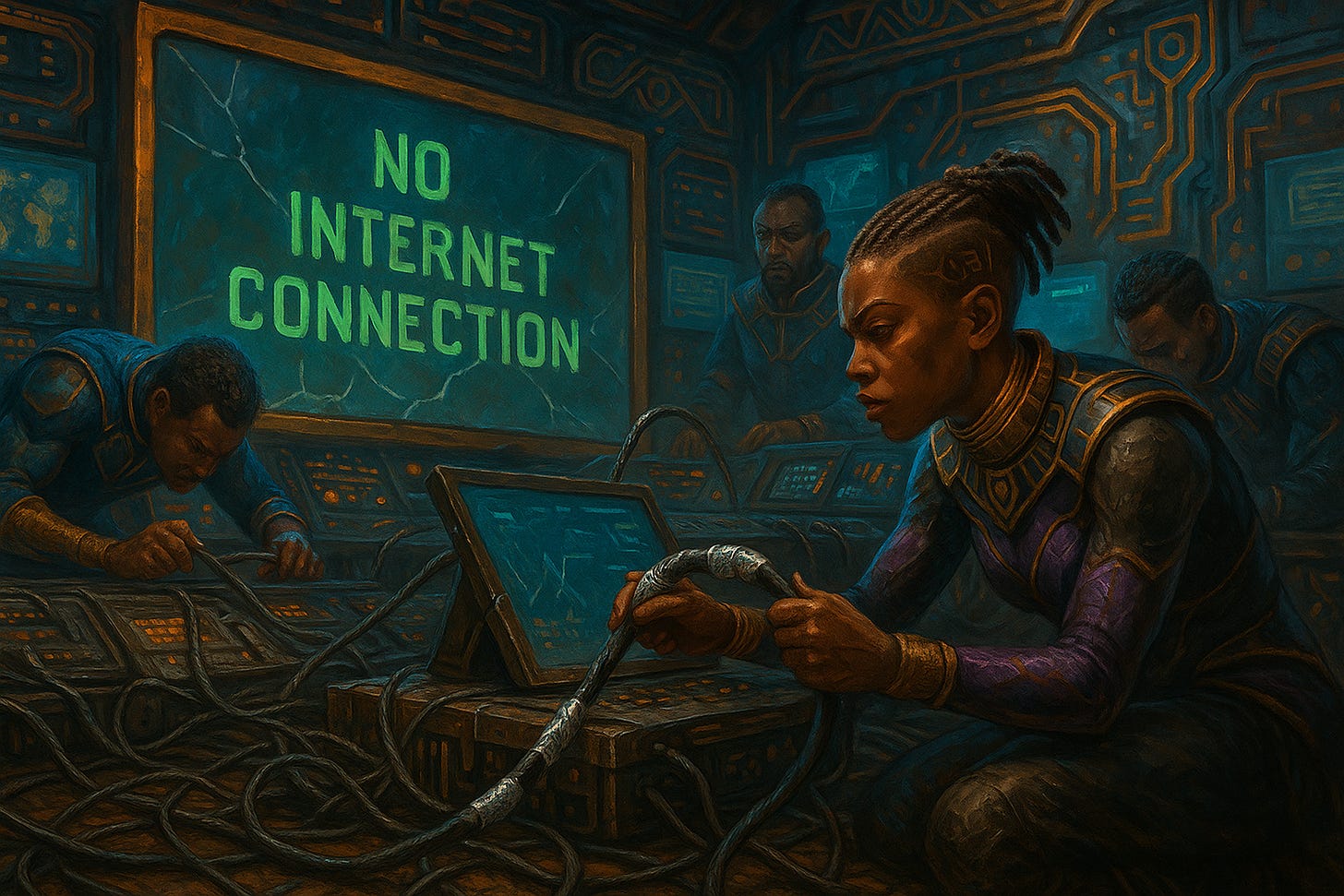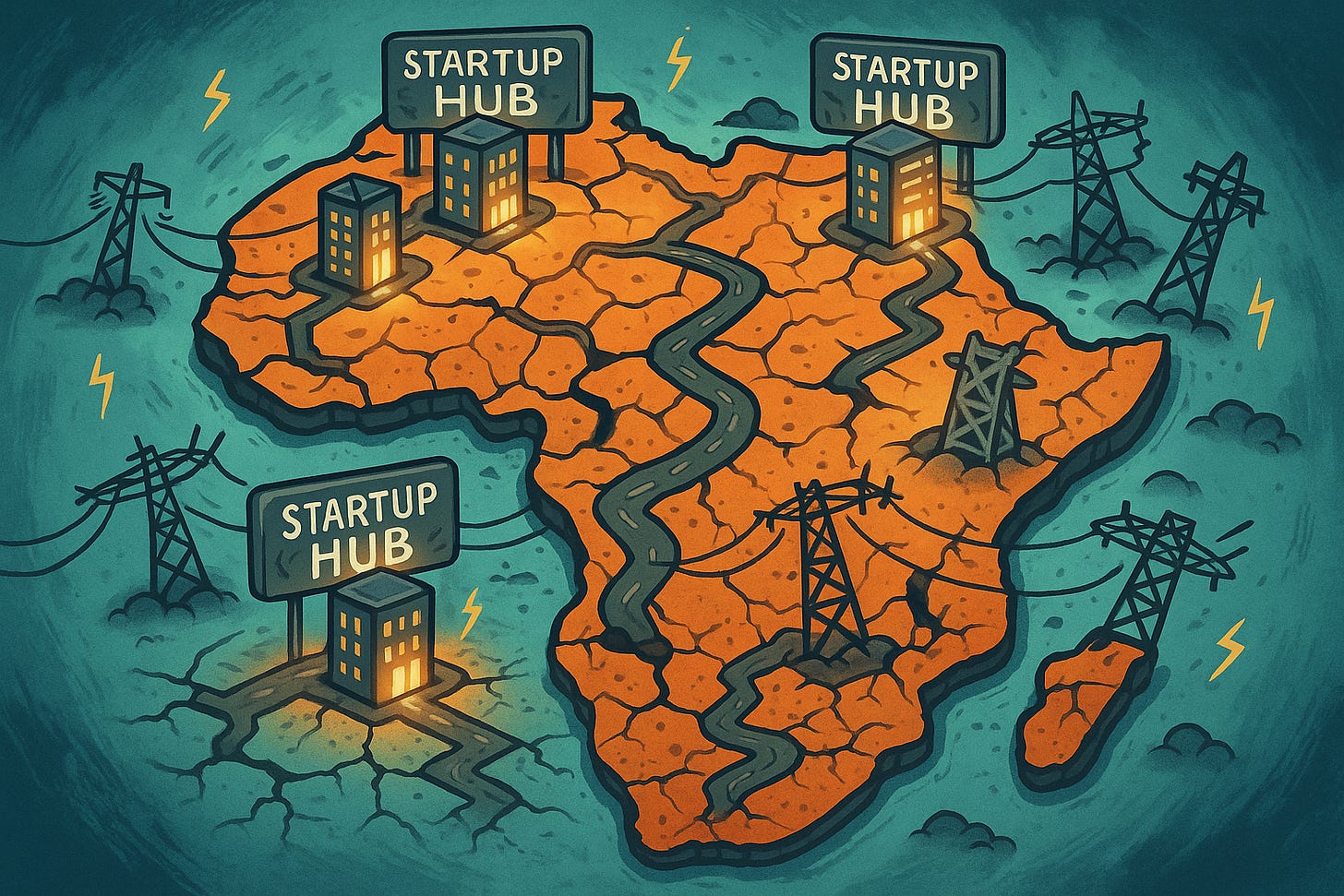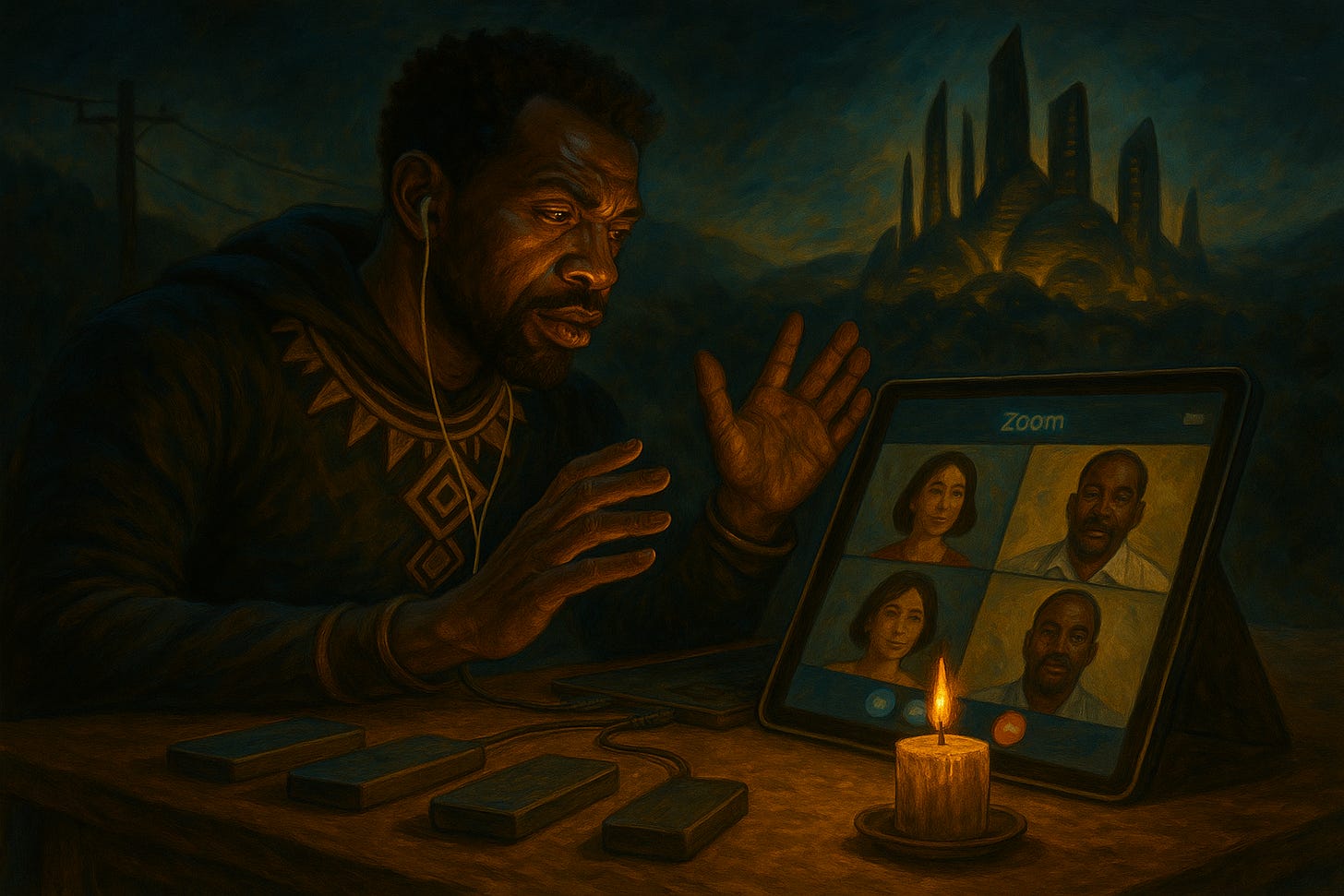The Wakanda Timeout
The disconnect between startup hype and reality in Africa
Picture this:
You’re at a tech conference in Sub-Saharan Africa. A founder in a hoodie clicks through a pitch deck with animations that could shame Pixar. He’s unveiling yet another delivery app, but this one only serves vegan jollof rice, accepts crypto, and has AI to predict your next craving. It’s slick, buzzy, and hitting all the right keywords for the VC crowd. The audience claps. The investor nods. Everyone’s impressed, not necessarily by the product, but by the polish, the promise, and the potential exit.
Then, just as the founder cues the demo, the Wi-Fi dies. The app freezes. The room collectively holds its breath while someone tries to hotspot from a phone that’s also running low on battery. That, my friends, is the problem. We're building glossy digital dreams on top of unstable, unreliable infrastructure. And no amount of innovation, no matter how rich the pitch is, if the basics like connectivity, electricity, and logistics can’t keep up.
The Startup Boom Is Real, So Is the Infrastructure Doom.
Let’s get this straight, Africa doesn’t lack talent. It doesn’t lack ideas. It lacks the infrastructure that makes those ideas viable. We're not talking fancy. We mean the basics: power that doesn’t ghost you mid-meeting. internet that doesn’t take a prayer and a sacrificial goat to stay on. roads that don't perform chiropractic adjustments on your spine. and postal and logistics systems that don’t require you to call five people to locate a package.
Meanwhile, we’ve got an app for church livestreams with AI-generated prayers. Bless up, but who's streaming it when the network is down? That’s the contradiction at the heart of the African startup narrative: We’re dreaming big but skipping the groundwork. If we don’t build up the systems that make innovation usable, all we’re doing is duct-taping a cracked pipe and calling it a smart upgrade.
Startups Can’t Save What Systems Are Failing
The truth? Most African startups are solving around infrastructure problems, not through them. An edtech app that streams live classes sounds revolutionary, but it’s just a fancy brochure if students don’t have stable internet, electricity, or a quiet place to learn. Without those basics, all the interactive quizzes and AI tutors in the world won’t bridge the education gap. A food delivery app is great until the first heavy downpour turns the city into a river.
These are not the fault of the founders, nor are they failures of imagination. They’re symptoms of an ecosystem forced to innovate within constraints that should have been removed decades ago. The danger is that we start mistaking these workarounds for progress. We start applauding digital band-aids while the wounds beneath remain open. When the metrics of success are app downloads instead of impact, and fundraising rounds instead of functionality, we risk building a mirage of advancement, one that looks impressive on paper, but collapses in practice. Until we address the physical and institutional systems that support innovation, we’ll keep solving in circles and calling it a “Boom”.
What does Africa need to do?
Here’s a 4-step, founder-focused plan for addressing Africa’s innovation infrastructure gap, written with an eye toward collaboration with government and systems change. Does it work on paper? maybe. But does it work in reality? There's only one way to find out…try.
Shift from “Disruption” to “Collaboration”. This is a tough bureaucratic process, but Founders should stop trying to “disrupt” broken systems and start co-designing better ones with public institutions.
Build Infrastructure-Aware Business Models. Founders should design startups that work with real infrastructure conditions, not ideal ones from pitch decks. Identify critical dependencies (power, logistics, data access) and integrate resilience into your model. Then, document and present these challenges as evidence to policymakers to co-invest in enabling infrastructure
Advocate Through Coalitions. One founder knocking on the ministry's door is an annoying mosquito. A dozen founders with shared data and policy asks? That's pressure. Join or create innovation coalitions and ecosystems that can lobby for infrastructure reform. Speak as a collective to unlock structural change.
Make Infrastructure Part of Your Pitch. If your app can’t scale without better roads or power, say so loudly and clearly. Talk to investors about what infrastructure your success depends on. Document the cost of poor infrastructure and the ROI of public-private collaboration. This not only strengthens your case, but it also pushes funding toward the roots of the problem.
Infrastructure is (Part of) Innovation
If we’re serious about real disruption in Africa, then we have to start seeing infrastructure not as the tedious stuff that someone else should handle, but as the trenches of innovation itself. Laying fiber optic cables to rural schools isn’t just a telecom task; it’s the foundation for digital equity, future-ready classrooms, and the next wave of creators.
And don’t get me started on transport: building inter-state railways that don’t feel like you're gambling with your spine isn't just about moving goods, it's about connecting ideas, expanding markets, and unlocking economic synergy between regions. Cold storage chains? They're not a luxury, they're the invisible infrastructure that turns agriculture into agribusiness. Without them, we're tossing tons of produce and missing billions in potential.
But here’s the kicker: We don’t celebrate the people who make these things work. The engineer who restores a downed power grid after a storm doesn’t get a panel slot at the Africa Tech Summit. The planner who designs a water system that works would not trend on LinkedIn. Yet without them, your viral app idea dies in the dark. It’s time we glorify not just the founder in a hoodie, but the infrastructure builder in a hard hat. Because real innovation doesn’t glow in the dark, it plugs into the grid.
Final Thought
As I try… yet again… to send money through my local bank app, only for it to vanish into the void instead of landing in my father’s account, it hits me: maybe Africa’s tech renaissance doesn’t just need more hackathons, it needs more hard hats. more apps that go viral as a result of impact, and more infrastructure that goes the distance.
There’s nothing wrong with dreaming in code. But before we build the future, we need to lay the foundation, literally… So here’s to the next wave of innovators. Not just founders. Fixers. Builders. System-thinkers. Because a continent can’t leapfrog its problems if the lily pad keeps collapsing.








I agree with you. We don’t need more fancy tech platforms that are basically just copy and paste of what already exists. If your tech is not intentionally solving for the African users, it’s going to become redundant. What’s the point of a delivery platform backed by tech when your rider has to call me for directions?
This was indeed a good read, asides the fancy ideas and massive technological ideas, building a structure that won't disrupt this fancy ideas is key. Well done Lou.